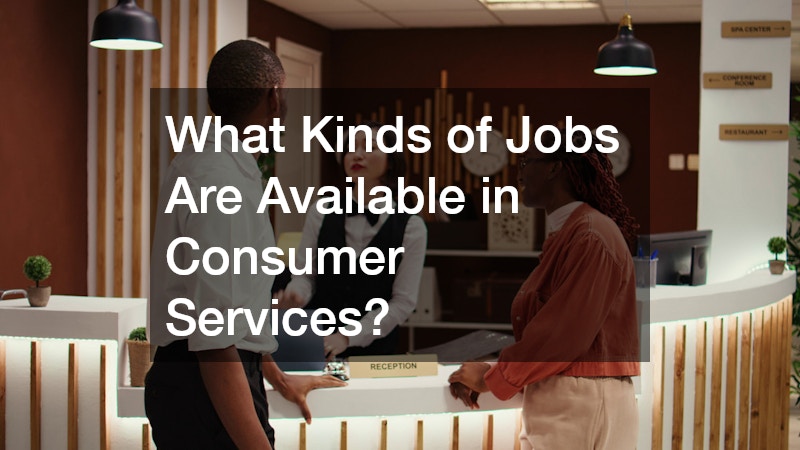
As the job market evolves with digital innovation and shifting consumer habits, more people are asking, “Is consumer services a good career path in 2025?” The answer is not one-size-fits-all, but for many career-driven individuals and job seekers, the consumer services industry offers a wealth of opportunities. This broad field encompasses everything from retail and hospitality to customer support, financial services, and digital platforms that serve individual consumers.
In this comprehensive guide, we’ll break down what makes consumer services a viable and attractive career path, especially as we move further into a tech-enabled, customer-centric economy. Whether you’re just starting your professional journey or thinking about making a switch, understanding the pros, challenges, and trends in this sector can help you make informed decisions for your future.
What is the Consumer Services Industry?
Before evaluating its career potential, it’s important to define what the consumer services sector actually includes. Unlike B2B (business-to-business) services, consumer services focus on delivering value directly to individuals through personal care, travel, finance, entertainment, or retail services.
Key Segments of Consumer Services:
- Retail: Online and physical stores (e.g., Amazon, Walmart, Target)
- Hospitality and Travel: Hotels, airlines, and tourism companies
- Food and Beverage: Restaurants, cafes, and delivery services
- Customer Support: Tech support, call centers, and help desks
- Personal Services: Beauty salons, fitness centers, and home services
- Financial Services: Banking, insurance, credit agencies
- Digital Platforms: Apps and websites offering user-focused services
Each of these segments provides roles ranging from customer-facing entry-level positions to high-level management and strategy jobs, making the field flexible and expansive.
Why Is Consumer Services Still Thriving in 2025?
Even in a world increasingly dominated by automation and AI, consumer services continue to thrive. Here’s why:
1. Customer Experience is a Priority
Companies are competing more on customer experience than on price or product. That means hiring people who can communicate effectively, solve problems quickly, and build customer loyalty.
2. Tech Integration is Creating New Roles
While automation is changing how services are delivered, it’s also creating new jobs in AI-assisted customer service, user experience (UX), and data-driven support systems.
3. Hybrid and Remote Models Are Expanding Access
From virtual customer support to remote sales, technology has opened doors for flexible, location-independent careers within consumer services.
4. Job Security in High-Contact Roles
Not all customer needs can be met by machines. Human interaction is still critical in hospitality, health, personal services, and financial advising.
As consumer demand for convenience, personalization, and responsiveness grows, companies are investing more in the people who deliver those experiences.
Is Consumer Services a Good Career Path in 2025?
Now to the main question: Is consumer services a good career path in 2025? For many career-oriented professionals, the answer is a solid yes—and here’s why.
Pros of a Career in Consumer Services:
- High Demand Across Industries
From e-commerce to fintech, most sectors need strong consumer-facing teams. - Low Barrier to Entry
Many roles require minimal experience or education, offering fast access to the workforce. - Transferable Skills
Communication, problem-solving, and empathy gained here are valuable in any career path. - Room for Advancement
Many companies promote from within, making it easier to climb the ladder over time. - Job Diversity
You can work in retail, hospitality, tech, or healthcare, without changing your core skill set. - Soft Skills Development
It’s one of the best industries to master emotional intelligence, conflict resolution, and customer engagement.
Potential Drawbacks:
- Lower Starting Salaries
Entry-level roles in customer service or retail may offer modest pay at the start. - High-Stress Environments
Constant customer interaction can lead to emotional fatigue or burnout. - Non-Traditional Hours
Nights, weekends, and holidays are often required in roles like hospitality and food service.
The key to long-term satisfaction in this field is finding the right niche and employer that aligns with your goals and lifestyle.
What Kinds of Jobs Are Available in Consumer Services?

The career opportunities in this industry are incredibly varied. Whether you’re looking for your first job, a leadership role, or a pivot into something new, there’s likely a position that fits.
🔹 Entry-Level Roles:
- Customer Service Representative
- Retail Sales Associate
- Hospitality or Front Desk Agent
- Call Center Support Staff
- Food Service Crew Member
🔹 Mid-Level Roles:
- Store or Department Manager
- Guest Experience Manager
- Digital Customer Experience Specialist
- Financial Customer Advisor
- Team Lead in Customer Support
🔹 High-Level or Specialized Roles:
- Director of Customer Success
- Head of Operations (Retail, Travel, etc.)
- User Experience (UX) Strategist
- Consumer Insights Analyst
- Loyalty Program Manager
With the right training, certification, or internal promotion, career growth is very attainable in this field.
How Much Can You Earn in Consumer Services?
Salary expectations can vary widely based on the role, location, and company. Here’s a rough idea of average U.S. annual earnings in 2025:
| Job Title | Average Salary (USD) |
| Retail Associate | $32,000–$40,000 |
| Customer Service Representative | $38,000–$50,000 |
| Assistant Store Manager | $45,000–$60,000 |
| UX Specialist | $70,000–$95,000 |
| Customer Success Manager | $75,000–$100,000+ |
| Director of Consumer Experience | $110,000–$150,000+ |
In addition to base salaries, many companies offer performance bonuses, profit sharing, and advancement opportunities.
What Skills Will Help You Succeed in Consumer Services?
To thrive in consumer services in 2025, you’ll need both hard and soft skills. The demand is shifting from just being friendly to being efficient, tech-savvy, and emotionally intelligent.
Must-Have Skills:
- Communication and Active Listening
- Problem-Solving and Adaptability
- Conflict Resolution
- Tech Fluency (CRM tools, chatbots, basic analytics)
- Multilingual Abilities (a bonus in global companies)
Emerging Skills in 2025:
- AI-Augmented Service Knowledge
- Data Interpretation and Personalization
- Remote Customer Management
- Sustainability and Ethical Engagement Practices
Investing in your skills—through workshops, certifications, or real-world experience—can help you stand out in a competitive job market.
What Are the Career Growth Opportunities?
Consumer services isn’t just a stepping stone—it can be a lifelong career with leadership potential. Many industry executives began their careers as customer service reps or store associates.
Growth Paths You Can Take:
- Operations and Management: From team leader to regional director
- Corporate Strategy: Transitioning into product or customer insights roles
- Entrepreneurship: Opening your own business in food, wellness, or services
- Specialization: Moving into UX, training, or AI-enabled support roles
If you’re career-minded and proactive, consumer services can offer both stability and upward mobility.
Is This the Right Path for You?
While consumer services are full of opportunity, it’s not the perfect fit for everyone. Here are some questions to help you assess:
Ask Yourself:
- Do you enjoy working with people and solving real-world problems?
- Are you comfortable in fast-paced or sometimes stressful environments?
- Are you looking for a flexible career path with room for advancement?
- Do you value soft skill development and real-time feedback?
If you answered “yes” to most of these, then consumer services may be a great career path for you in 2025 and beyond.
What Industries Are Hiring Most in Consumer Services in 2025?
The consumer services job market in 2025 is being fueled by rapid growth in a few standout industries. E-commerce and retail continue to dominate due to increased online shopping and omnichannel customer engagement. Healthcare services, including patient experience roles, are also growing as patient-centric care becomes a focus. Travel and hospitality have rebounded post-pandemic, creating new openings in customer support and guest services.
Additionally, financial services like banking, insurance, and fintech are expanding their client experience teams. These sectors are actively hiring, offering diverse opportunities from entry-level to senior roles for professionals ready to grow in a service-first economy.
How Does AI and Automation Impact Jobs in Consumer Services?
AI and automation are transforming the consumer services industry—but not necessarily replacing jobs. Instead, they are augmenting roles by handling routine inquiries, streamlining service workflows, and personalizing customer interactions through data. Chatbots and AI-powered CRMs now assist human agents, enabling faster resolutions and reducing burnout. This shift requires workers to upskill in tech-enabled environments, focusing more on emotional intelligence, decision-making, and creativity—areas where machines fall short.
As a result, professionals who embrace digital tools and evolve their skillsets will thrive. Far from making the industry obsolete, technology is helping it become smarter, more efficient, and even more human-centered.
What Certifications or Education Can Boost Your Consumer Services Career?

While many consumer service roles don’t require a college degree, gaining certifications and specialized training can significantly enhance your career prospects. Courses in customer experience management, hospitality, sales, digital marketing, or service excellence can help you move into higher-paying or leadership positions. Programs like Certified Customer Experience Professional (CCXP) or Hospitality Management Certification are increasingly valued by employers. For tech-savvy professionals, credentials in CRM platforms like Salesforce or Zendesk can open doors to digital support and UX roles.
Investing in your education—whether through online programs, workshops, or in-house training—signals to employers that you’re serious about long-term growth in this field.
Conclusion: Should You Pursue a Career in Consumer Services?
So, is consumer services a good career path in 2025? If you’re looking for a dynamic industry that values human interaction, adaptability, and growth potential, then absolutely—yes.
The industry offers roles that are flexible, scalable, and increasingly tech-enhanced. It’s a smart choice for those seeking job stability, professional development, and a people-focused work culture. Whether you’re fresh out of school, returning to the workforce, or pivoting mid-career, consumer services has a place for you.
